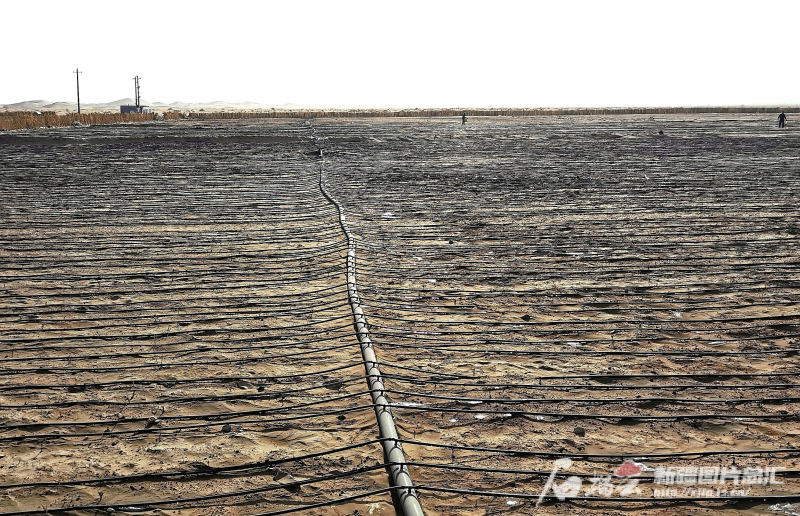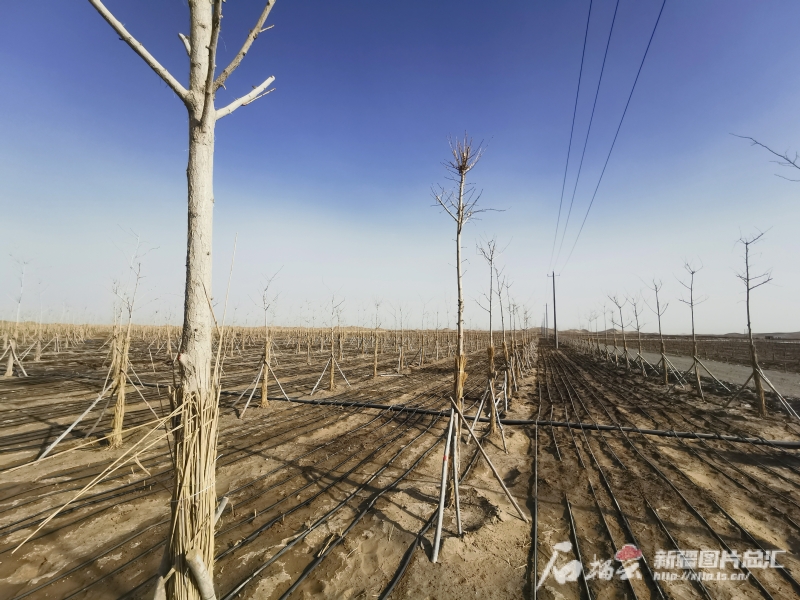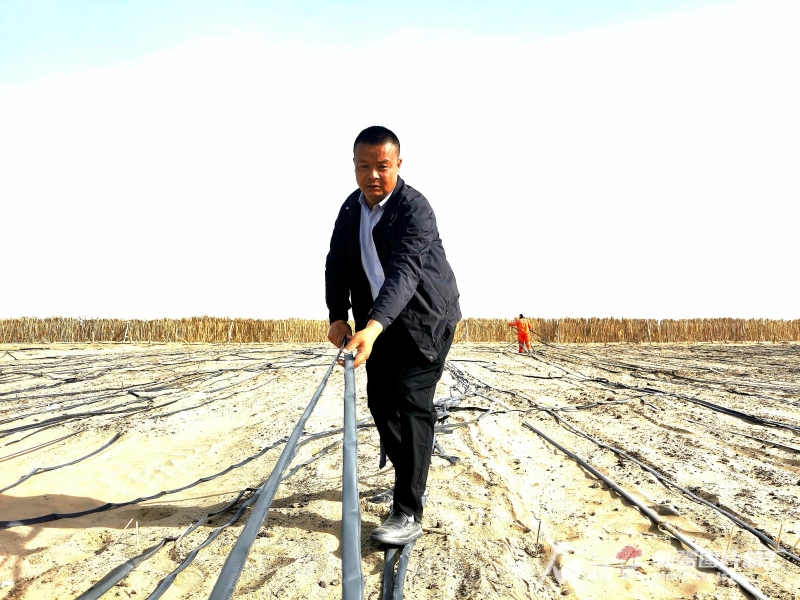Shiliuyun-Xinjiang Daily (Reporter Cao Hua) news: At 10 a.m. on April 8, 2025, sunlight bathed the land of the Garden of Diverse Flora Sand Industry Experimental Base in Yutian County, Hotan Prefecture, northwest China’s Xinjiang Uygur Autonomous Region. Strips of black drip irrigation tapes stretched toward the horizon, resembling musical staves drawn across the flat sandy terrain.

Photo shows strips of black drip irrigation tapes stretch toward the horizon in Yutian County, Hotan Prefecture, northwest China’s Xinjiang Uygur Autonomous Region. (Photo by Shiliuyun-Xinjiang Daily/Cao Hua)
55-year-old Ruzi Yusup opened the valve, allowing clear water to spray from the tiny holes in the drip irrigation tapes, forming a fine mist that sparkled under the sunlight. In the distance, newly planted Chinese medicinal herbs had already sprouted tender buds, showcasing the freshness of spring.
"In another month, this place will be covered in lush greenery, and the fragrance of Chinese medicinal flowers will fill the air," Ruzi Yusup envisioned with anticipation.
Ruzi Yusup is a villager from Yarmaihaili Village, Aoyituogelak Township, Yutian County, Hotan Prefecture. A month ago, he joined Xinjiang Tianyuan Agricultural Technology Co., Ltd., starting to plant Chinese medicinal herbs such as sophora flavescens (kushen), isatis root (banlangen), scutellaria root (huangqin), and ginkgo at the Garden of Diverse Flora Sand Industry Experimental Base. The company has been trial-planting 36 varieties of Chinese medicinal herbs to identify the most suitable varieties for desert cultivation, thereby exploring experience for the development of the sand industry.
After three decades of farming, it was Ruzi Yusup’s first work with Chinese medicinal herbs. He was a complete novice when it came to planting herbal seedlings, sowing seeds, and watering—skills he had yet to master. Among the 36 varieties of medicinal herbs, he had only ever heard of isatis root (banlangen) before.
"Although I know nothing about Chinese medicinal herbs, I've been farming all my life. Growing medicinal herbs is similar to farming crops in many ways. With dedication to learning, I'm confident I can master it," Ruzi Yusup expressed with optimism.
Under the guidance of technicians, Ruzi Yusup learned that seeds should be sown at a depth 25 times their diameter. Planting too shallow would hinder the roots from taking hold, while planting too deep would hinder germination.
With a shovel in hand, Ruzi Yusup dug into the sandy soil, calculating the precise depth before scattering the seeds and covering them. The drip irrigation system would then thoroughly soak the sand, creating the ideal conditions for germination.
"Peppermint, white paeony root, and tree peony require more water, while rehmannia root and red sage need less," Ruzi Yusup memorized the watering needs of each herb. During his daily inspections, he would dig into the sand to check the moisture levels of the soil.

Photo shows the ginkgo trees transplanted at the Garden of Diverse Flora Sand Industry Experimental Base in Yutian County, Hotan Prefecture, northwest China’s Xinjiang Uygur Autonomous Region. (Photo by Shiliuyun-Xinjiang Daily/Cao Hua)
Southern Xinjiang experiences frequent sandstorms and strong winds in spring, posing risks to the newly sprouted seedlings planted at the Garden of Diverse Flora Sand Industry Experimental Base. To protect these young plants, Ruzi Yusup and his colleagues constructed high-standing sand barriers around the perimeter of the base, measuring 1.6 meters in height and stretching 3,200 meters in length. "However, sometimes the hot winds still dry out the seedlings. We must detect it in time and replant them to ensure all the seedlings in the base eventually survive," Ruzi Yusup remarked.
Ten workers at the Garden of Diverse Flora Sand Industry Experimental Base are villagers from nearby villages. They cherish this job opportunity that allows them to work close to home, so have, in just one month, basically mastered the skills required for daily management.
"My family has nine mu (about 0.6 hectares) of land, mainly planted with wheat and corn, yielding an annual income of less than 20,000 yuan. Now, working at the base, I earn a monthly wage of 2,800 yuan. If things go well, I could potentially double my annual income," said Ruzi Yusup.
Suddenly, a strong wind blew across the field, scattering the drip irrigation tapes in all directions. Xu Guoying, the general manager of Xinjiang Tianyuan Agricultural Technology Co., Ltd., quickly called Ruzi Yusup to tidy up the drip irrigation tapes together.

Photo shows Xu Guoying tidies up the drip irrigation tapes. (Photo by Shiliuyun-Xinjiang Daily/Cao Hua)
Starting from land leveling in the sandy areas last autumn to the large-scale planting of medicinal herbs this March, Xu Guoying has been spending every day on the field, his face tanned from the sun.
"The company invested 3.5 million yuan (about 479,810 U.S. dollars) to develop 1,000 mu (about 66.7 hectares) of land in the Garden for trial cultivation of medicinal herbs. Following the plan of planting 10 mu for each variety, we aim to identify the medicinal herbs suitable for cultivation in Yutian County through one to two years of trial planting, and gradually promote them on a larger scale," said Xu Guoying. He added that by developing the cultivation of medicinal herbs, it not only provides more options for local people to engage in sand-based industries but also helps mitigate market risks.
In 2024, Yutian County has planned a 40,000-mu (about 2,667 hectares) desertification control demonstration zone in the Garden. The plan is to transform the Garden into a medicinal herb cultivation base in Yutian County by developing the cultivation of desert roses and medicinal herbs, thereby promoting the local medicinal herb industry.
"We have already completed the planting of 36 varieties of medicinal herbs, and most of them have sprouted. Moving forward, we need to overcome the challenge of dry and hot winds in June and July and earn more experience in cultivating medicinal herbs," said Xu Guoying.
(A written permission shall be obtained for reprinting, excerpting, copying and mirroring of the contents published on this website. Unauthorized aforementioned act shall be deemed an infringement, of which the actor shall be held accountable under the law.)









